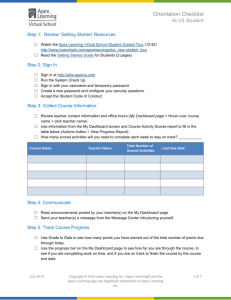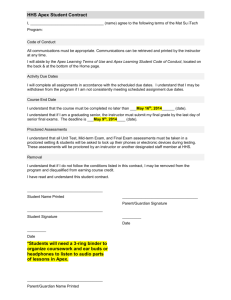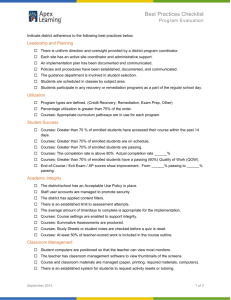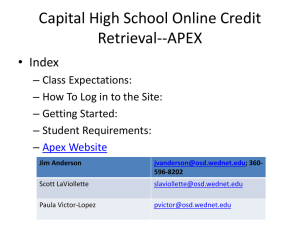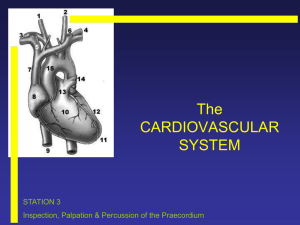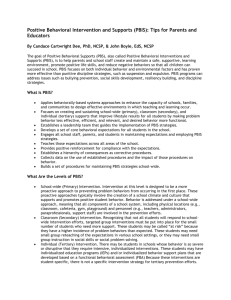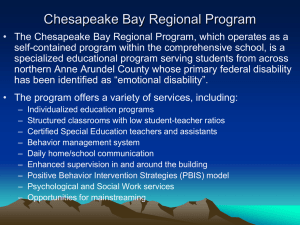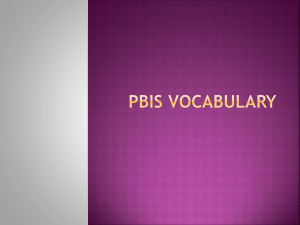APEX II
advertisement
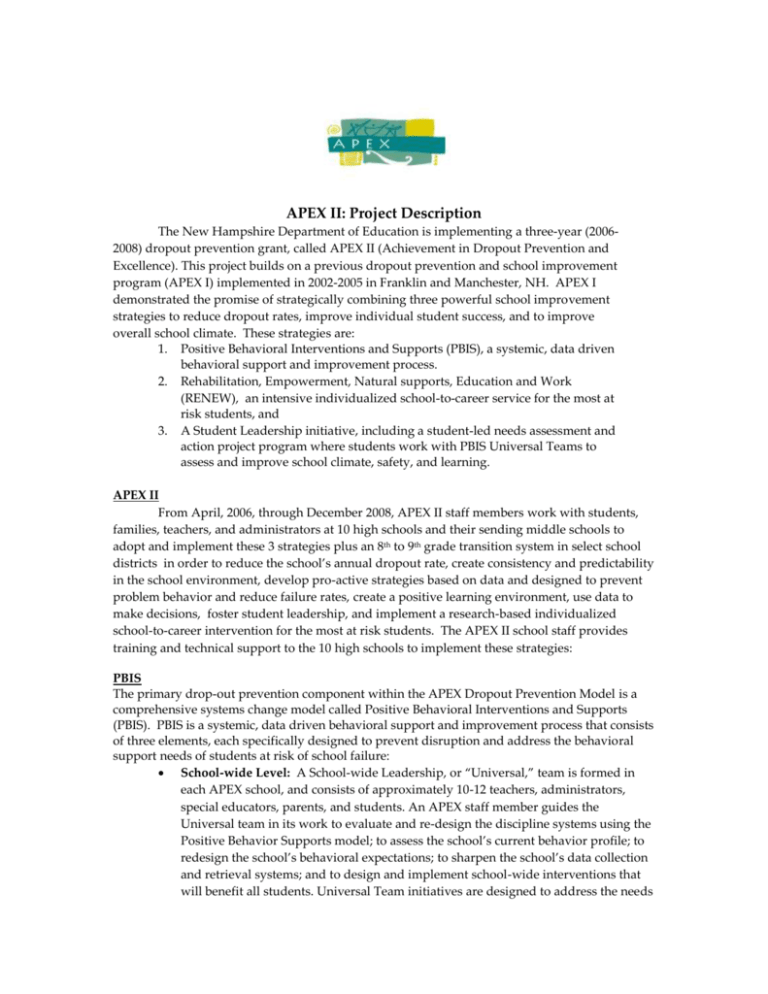
APEX II: Project Description The New Hampshire Department of Education is implementing a three-year (20062008) dropout prevention grant, called APEX II (Achievement in Dropout Prevention and Excellence). This project builds on a previous dropout prevention and school improvement program (APEX I) implemented in 2002-2005 in Franklin and Manchester, NH. APEX I demonstrated the promise of strategically combining three powerful school improvement strategies to reduce dropout rates, improve individual student success, and to improve overall school climate. These strategies are: 1. Positive Behavioral Interventions and Supports (PBIS), a systemic, data driven behavioral support and improvement process. 2. Rehabilitation, Empowerment, Natural supports, Education and Work (RENEW), an intensive individualized school-to-career service for the most at risk students, and 3. A Student Leadership initiative, including a student-led needs assessment and action project program where students work with PBIS Universal Teams to assess and improve school climate, safety, and learning. APEX II From April, 2006, through December 2008, APEX II staff members work with students, families, teachers, and administrators at 10 high schools and their sending middle schools to adopt and implement these 3 strategies plus an 8th to 9th grade transition system in select school districts in order to reduce the school’s annual dropout rate, create consistency and predictability in the school environment, develop pro-active strategies based on data and designed to prevent problem behavior and reduce failure rates, create a positive learning environment, use data to make decisions, foster student leadership, and implement a research-based individualized school-to-career intervention for the most at risk students. The APEX II school staff provides training and technical support to the 10 high schools to implement these strategies: PBIS The primary drop-out prevention component within the APEX Dropout Prevention Model is a comprehensive systems change model called Positive Behavioral Interventions and Supports (PBIS). PBIS is a systemic, data driven behavioral support and improvement process that consists of three elements, each specifically designed to prevent disruption and address the behavioral support needs of students at risk of school failure: School-wide Level: A School-wide Leadership, or “Universal,” team is formed in each APEX school, and consists of approximately 10-12 teachers, administrators, special educators, parents, and students. An APEX staff member guides the Universal team in its work to evaluate and re-design the discipline systems using the Positive Behavior Supports model; to assess the school’s current behavior profile; to redesign the school’s behavioral expectations; to sharpen the school’s data collection and retrieval systems; and to design and implement school-wide interventions that will benefit all students. Universal Team initiatives are designed to address the needs of the majority of the student body who have the fewest social, behavioral or academic challenges. Secondary Level: APEX schools also develop a secondary level, or “Targeted Team” of specialists and administrators that focuses on those students who exhibit challenging behaviors and who are at risk for school failure due to academic, social or behavioral issues. The goal of this team is to design interventions for the student or group of students based upon a functional and contextual assessment or Functional Behavioral Analysis (FBA). These “function-based” interventions have been proven highly effective in the reduction of problem behaviors and the associated negative consequences. Intensive Level: An APEX II facilitator trained in an individualized, school-to-career service model called “RENEW” works with staff members at each high school and with specialists from community-based organizations to identify individual students who are struggling to complete their program or who have already dropped out of school. A support team is formed around each student and works with the student to develop individualized, student-directed school-to-career plans designed to help the student earn credit toward graduation through appropriate alternative means. RENEW- Rehabilitation, Empowerment, Natural supports, Education and Work The intensive component in a PBIS model typically includes wraparound services for children whose support needs extend beyond the capacity of the school. At the high school level, APEX II uses a model for high risk youth that has proven effective in helping students graduate, find employment and post-secondary education, and make the transition into adult life. This model, RENEW, (Rehabilitation for Empowerment, Natural supports, Education and Work) supports students to develop personal futures plans, alternative high school graduation plans, the supports they need to complete their coursework, assists with finding employment, and assists with making those connections with resources in the community. APEX PBIS MODEL Tertiary Prevention: RENEW Intervention ~5% ~15% Secondary Prevention: Specialized Group Systems for Students with At-Risk Behavior Primary Prevention: School-/ClassroomWide Systems for All Students, Staff, & Settings ~80% of Students Student Leadership Teams In a group of 5-6 APEX II schools where the faculty has adopted PBIS, Universal Teams will have the opportunity to collaborate with a carefully selected Student Leadership Team. The purpose of adding a Student Leadership team is to expand upon the PBIS core principle of “active participation of students” as part of the school improvement process. In these APEX Schools, a diverse group of student leaders are selected and invited by the principal and Universal team to play important leadership roles as researchers and school improvement partners who will focus their leadership efforts on the assessment and improvement of school climate, safety, and learning in order to gather information about school culture and climate from a variety of perspectives. *8th to 9th Grade Transition Programs and Services Most students who experiences failure and behavioral problems in middle school tend to have higher rates of negative outcomes in high school, including dropout, academic difficulties, and behavioral problems. In several school districts, APEX staff members are working with teams in the sending middle schools and developing secondary and tertiary interventions to prevent or ameliorate the difficult transition to high school culture and expectations The Rational for APEX Research tells us that students with certain characteristics are more likely to dropout of school. These student characteristics include low socio-economic status (Rumberger, 1987; 1995), educational barriers (Wagner, 1991; 1995), membership in certain ethnic or minority groups (Rumberger, 2001), or a history of abuse, neglect or substance abuse in the family (Alexander, et al., 1997; Kortering, et al., 1992). The research also tells us that some high schools have higher dropout rates than other high schools when controlling for these student-related factors (Rutter, 1979; Merritt, 1983). High schools with better student outcomes tend to have well- organized, consistent and positive systems of discipline and tend to have a philosophy that all students should be successful (Bryk & Thum, 1989; Gottfredson, Gottfredson & Hybl, 1993; Nelson, 1996; Rumberger, 2001). The New Hampshire APEX model is based on this research and the philosophy that school factors can contribute to lowering dropout rates, and that all students should have the individualized supports necessary to succeed. The NH APEX model is designed to achieve five outcomes: 1) to significantly reduce the high school’s drop out rate, 2) to implement a school-wide positive behavioral system in the high schools in order to reduce the suspension and expulsion rates, including meaningful student and parent involvement in decision-making, 3) to provide an intensive and individualized school-tocareer service for current dropouts or students at great risk of failure so that a significant majority of those students successfully complete high school, 4) to develop a transition process for at-risk 8th graders so they have a successful transition to 9th grade, and, 5) to expand the state’s capacity to implement these proven dropout prevention strategies by creating comprehensive and highquality professional development and technical assistance capacities through multiple venues and training levels Collaboration with Other Initiatives The New Hampshire Department of Education has embraced PBS as a high priority strategy for school improvement, and has worked with Rivier College and SERESC to create the New Hampshire Center for Effective Behavioral Interventions and Supports (NH-CEBIS). APEX has joined resources with NH-CEBIS to provide training for all levels of PBS implementation, and to ensure that the APEX II schools have access to strong technical assistance, data collection and evaluation services. In addition, APEX II is collaborating with the NH Systems of Care in Education initiative and the state’s Youth Vision Committee. The APEX II staff is working with the NH Federation of Families and NAMI-NH to ensure parent participation at the individual, school and community levels. The Family Resource Network at the New Hampshire State Library is also part of APEX II, obtaining and providing resources and information on PBIS, dropout prevention, disability and education, and secondary transition. APEX Contacts: APEX II Project Director: Robert Wells, Ph.D., NH Department of Education. (603) 2711536, rwells@ed.state.nh.us McKenzie Harrington, APEX II Program Specialist, NH Department of Education. (603)271-3739, mharrington@ed.state.nh.us Project Co-Director: JoAnne Malloy, UNH/Institute on Disability. (603) 228-2084, jmmalloy@aol.com Project Co-Director: Kathleen Abate, Alliance for Community Supports, Inc. (603) 6287681, gsffcmh@aol.com Websites and Resources: State of New Hampshire Department of Education: www.ed.state.nh.us Institute on Disability: www.iod.unh.edu Alliance for Community Supports: www.allianceforcommunitysupports.com The National High School Center: www.betterhighschools.org International Association of Positive Behavioral Support: www.apbs.org NH-Center for Effective Behavioral Interventions and Supports- CEBIS: www.nhcebis.seresc.net Main Street Academix: http://www.msanh.com/ National Secondary Transition TA Center: www.nsttac.org National Post-School Outcomes Center: www.psocenter.org National Dropout Center for Students with Disabilities: www.ndpc-sd.org Technical Assistance Center on Positive Behavioral Interventions and Supports (PBIS): www.pbis.org NH Family Resource Connection Library: www.nh.gov/nhsl/frc/catalog.html Council for Exceptional Children: www.cec.sped.org Research and Training Center on Family Support and Children’s Mental Health: portlandrtc@pdx.edu ****APEX II is a Dropout Prevention grant funded by the U.S. Department of Education, Office of Elementary and Secondary Education. (CFDA No: 84-360A) INITIAL RESULTS: APEX II High Schools: Dropout Rates 10 8 6 4 2 0 2003-04 2004-05 2005-06 10 Av er ag e 9 8 7 6 5 4 3 2 1 2006-07

